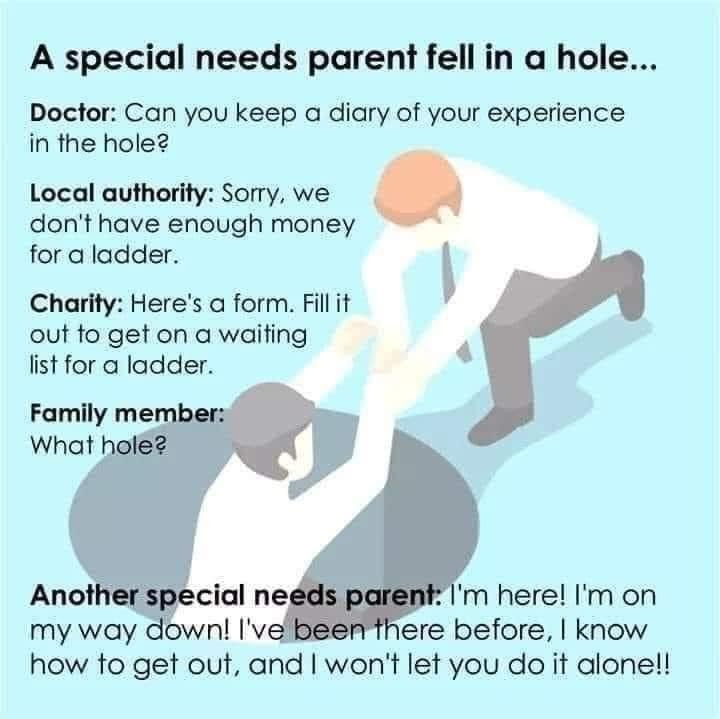Possibilities

Late last week, I was admitted to the hospital. Thankfully, my condition isn’t life-threatening. But this was the third time this summer that I started in the ER, traveled through radiology, and landed in a hospital bed for several days. Once the pain subsided, I had way too much time alone to think about what it all might mean. And what if it were more serious. What then for my family, especially my son with disabilities? What will happen to him if something happens to me?
For many of us, just getting through the day is challenging enough. Helping our “kids” navigate school, employment, friendships and other important aspects of life takes all we’ve got. Denial, or at least procrastination, often seems the best way to deal with uncertain futures. As I’ve said before, though, one thing is for sure: no parent lives forever. And the peace of mind that comes from planning ahead is a priceless gift to ourselves and everyone else that matters in our lives.
As I sat in my lonely hospital room, amdist the whirring medical machines, cold fluorescent lights and noisy call buttons, I contemplated our state of affairs. While we’ve still got a long way to go, our family has made great strides in recent years to help Andrew be more independent and truly enjoy the life he’s building for himself. It’s definitely not easy, and even fully understanding all that’s entailed can be pretty overwhelming at times.
Taking any step, though, is a step in the right direction. Please reach out if you want some help getting started. Progress takes many forms, but it doesn’t happen without some concentrated effort. I believe the next step on my journey is helping other parents on theirs. Maybe we can take some steps together, one at a time.
Until then, take care of yourself. Get some rest. Eat healthy food. Appreciate the overworked healthcare providers and caregivers in your life, even if they don’t have all the answers. I’m trying really hard to do the same. One step at a time.

Impossible is just a big word thrown around by small men who find it easier to live in the world they've been given than to explore the power they have to change it.
Impossible is not a fact. It's an opinion.
Impossible is not a declaration. It's a dare.
Impossible is potential.
Impossible is temporary.
Impossible is nothing.
—Muhammed Ali
Perfectly put.
When thinking about the future, will we ever be able to stop thinking about Covid19? It’s been awhile since I touched on this topic here, but I know it’s on everyone’s mind. After all, the pandemic has hit people with disabilities (and their caregivers) especially hard.
I started following mother, author, and Brown University professor Emily Oster at the beginning of the pandemic. Here she weighs in with thoughtful perspective on “when will it be over.” I respect her ability to communicate complicated data and research into user-friendly, non-alarmist language. Good reading for anyone who cares about and loves others. What do you think?

Time’s up.
The issue of A.D.A. compliance is far too complicated to adequately address in this newsletter. A recent New York Times article is well worth reading, however, to better understand the challenges people with disabilities face because A.D.A. isn’t adequately enforced by municipalities or complied with by local businesses.
I imagine every reader of this issue has witnessed some lack of compliance with this federal law and probably never said a thing. I’m ashamed to admit that I’ve even been too tired or embarrassed to speak up some days. And I know I’m not alone.
As the Times clearly explains, “The trouble with accessibility litigation is that the discussion always seems to boil down to money. Frequently left out is the role of the government. If the federal government truly prioritizes disabled people’s needs… perhaps it should help offset the costs for small businesses to improve their accessibility. At the very least…city and county building inspectors should be better versed in the A.D.A. and ensure compliance upon inspection, thereby taking some of the burden off the disabled to act as enforcers.” Seems fair, I think. How about you?
George Bush was rather clear when he signed the A.D.A. into law more than three decades ago (31 years this past July). If you see something, say something. Lawyers aren’t the only ones who can speak out (and take money from small businesses). A.D.A. compliance requires community commitment and collaboration. Because it’s the right thing. Because it’s the law. And because it’s long overdue, frankly. According to the Bystander Effect, all we really need is one person to stand up in order for others to follow.
Did you know your local government is required to have an A.D.A. Coordinator if it employs 50 people or more? This person is responsible for coordinating the efforts of the government entity to comply with and investigate any complaints filed in connection with A.D.A. His/Her/Their name, office address, and telephone number must be provided to interested persons to help enhance A.D.A. compliance. Reach out to me if you need help in your area.
Home sweet home.
According to Easter Seals, only 17% of adults with disabilities in the U.S. live independently. About 70% live with their parents or other relatives and 10% live in group homes or other settings. Room-mate sharing programs like Partners4Housing are fast-becoming another attractive choice for people seeking a change.
Want to learn more about how to develop housing options for adults with disabilities in your area? Mainstreet Connect is hosting an informative three-day Inclusive Housing Development Conference in early November to help you:
-
Learn from organizations and leaders in the housing development phase
-
Understand concept vs. reality from organizations already in operation
-
Participate in conversations with thought leaders around the country and explore different housing concepts and models for your community
-
Learn various funding and financing sources
-
Participate in thoughtful and timely advocacy and policy discussions
As seen on social media. Sound familiar?

Interested in learning more about working with Kris?
Contact us for information on what this might look like for you, including outcomes, availability, fees and more.
Stay connected with news and updates!
Sign up below to receive our newsletter and updates.
We hate SPAM. We will never sell your information, for any reason.


